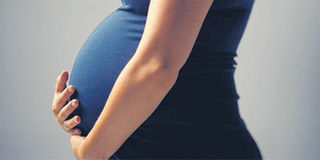When aborting isn’t a good option

Pregnant woman: It is uncommon in Tanzania, to find a woman still enjoying her new baby and spending sleepless nights for it but still she becomes pregnant again within 3 months after her previous childbirth.
What you need to know:
- Dr Lugano has come across many women who wish to abort their pregancies after they conceived unexpectedly. He advises against it.
One of the patients that visited my office recently bombarded me with a question, “How soon does someone get pregnant again after giving birth?”
It was a question from mother who had come to our department for a Reproductive and Child Health Clinic visit.
But that was not the first time I encounter such a question. On another occasion, another woman asked, “Results for my Urinary Pregnancy Test (UPT) turned positive, but am still nursing a 4month old baby, what should I do Doctor?”
In the recent past I got an opportunity to tour 52 health facilities and attending mothers at RCH clinics at least for one day in each health facility.
I crisscrossed Tanzania mainland in a bid to search far and wide; trying to establish the status of reproductive health services delivery in our country; with a sole focus on Family Planning programs and routine Antenatal services.
What I came to realize is that similar questions—such as those I got from the two women who visited my office in Dar es Salam—were being asked by a host of women.
Of late I have been posted at one of the famous medical centers in Dar es Salaam, where among other duties I get such an opportunity to attend clients with reproductive health concerns, questions being asked by mothers are similar.
Interestingly though, I have been attending mothers who become pregnant after giving birth either by vaginal delivery or by C/section, seeking my advice on their fate and each time I am about to give them a response, they appear to be very inquisitive.
And, usually there is a conclusion that they would like to hear from me as a Doctor—aborting.
Why aborting? It’s because most of them have become pregnant accidentally—oblivious of the proper timing. To me, this is recklessness.
I mean; how do you expect to be advised to abort the pregnancy simply because you don’t care or you are oblivious of what you did?
Needless to say, it is not an uncommon phenomenon in Tanzania, to find a nursing mother who is still enjoying her new baby and spending sleepless nights for it but still she becomes pregnant again within 3 months after her previous childbirth.
Giving your body proper time to recuperate after giving birth is quite important for your reproductive health before getting pregnant again; however individual circumstances can dictate the proper time when it may be deemed apt to become so.
Most Obstetricians do recommend waiting for 18 months after birth to become pregnant once again, however, some women do it earlier than the prescribed period without any serious adverse medical outcome.
Of course it can take a year for your body to offset the nutritional deficit brought forth by pregnancy, thus the 18months duration is sufficient time for your body to regain your pre-pregnancy state before you become pregnant again.
Let alone, the nutritional restoration, you know pregnancy takes a toll on your body, whether you delivered vaginally or surgically ,for the next pregnancy you must give your body sufficient time to recover from this major procedure/surgery before having it again.
See this scenario again. Another woman visited me in pursuit of my professional advice on her maternal issues, she narrated to me that she is in her late 30s and therefore she thinks that she is old enough to not to wait any longer.
Of course she was right to think so since it is true that the possibility of pregnancy complications increases with age , moreover it is asserted that a woman’s fertility declines with age ,your fertility peaks at the age 30, thus a number of women do opt for becoming pregnant again soon after giving birth for that good reason.
In another Incidence, a lady, 8months post-surgical delivery (C/Section) who came at our medical centre through routine formalities was tested for pregnancy and found to be positive, but since her reproductive history sounded controversial I decided to order an “Obstetric Ultrasound.”
In the end, it revealed the same conclusion. I held a lengthy discussion with her regarding the fate of her pregnancy, however in the end she told me that she was not ready for another baby on grounds that she still wanted to warmly and wholly take care of her current baby.
After beating around the bush, she was then of the opinion that every possible course of action should be attempted to that end, then in a quick rejoinder I kept her well informed on the professional as well as the legal aspects of her opinion.
Normally a scar heals by 3months after surgical delivery but its quite important waiting at least 6months incase your Doctor wants try for vaginal Birth for the next delivery (Vaginal birth after surgical delivery- VBAC).
However, 12- 18 months would even be better because when you delay to become pregnant again you offer a leeway for your scar to heal and become stronger.
Normally when there is a small gap between pregnancies, it increases the risk of facing placental praevia (low lying placenta), or placental abruption (separation of the placenta from the womb) and uterine rupture, however most Doctors do report that the risk of getting complications is relatively low.
In countries where “induced abortion” is legally accepted unlike here in Tanzania, a woman may be advised to abort incase she wishes to do so or on the ground of a relative/absolute medical indication.
However ultra-sound report is crucial especially to women with history of surgical deliveries.
There is a doctor, a consultant Obstetrician who offers online counseling services on maternal health through www.justanswer.com.
He insists that a Doctor ordering an Ultrasound should specifically ask for report on the thickness of the wall of the uterus at the scar, he further exemplifies that, he personally decided against a less similar procedure (endometrial ablation) to a patient who had history of 3 C/sections with the Ultrasonographic findings of uterine wall thickness near the scar measuring under 1cm.
When I approached Nursing officers in charge of reproductive services at SUNA medical centre in Dar es salaam (Sr. Joyce Kijole, Sr. Mwang’ombe, and Sr. Moshi), they told me that they usually advise couples to adopt appropriate family planning methods 42 days after delivery, provided that the mother breastfeeds the baby correctly and consistently, and yet they insisted that “Breastfeeding” is not a reliable way of birth control. The cessation of menstruation should not make someone believe that she can’t conceive.
Ooh!! I have run out of the editorial space, now let me end by pleading with all women to seek medical advice at nearby Reproductive health units instead of banking so much hopes on local herbs, myths and street self-trained healers, unschooled street UPT dealers, unschooled street and Misoprostol Prescibers, take heed of this piece of advice—not to fall prey to them.
Dr. Lugano is a Medical Doctor, A researcher, and A young Scientist. Email: [email protected]




